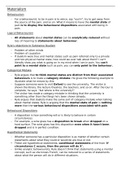Materialism
Behaviourism
For a behaviourist, to be in pain is to wince, say "ouch!", try to get away from
the source of the pain, and so on. What it means to have the mental state of
pain is to display the behavioural dispositions associated with being in
pain.
Logical Behaviourism
– All statements about mental states can be analytically reduced without
loss of meaning to statements about behaviour.
Ryle’s objections to Substance Dualism
Problem of other minds
Problem of causation
If dualism were true and mental states such as pain referred only to a private
and non-physical mental state, how could we ever talk about them? I can't
literally show you what is going on in my mind when I am in pain. You can't
point to a mental state such as pain, you can only point to the behaviour.
Categorical Mistake
Ryle argues that to think mental states are distinct from their associated
behaviours is to make a category mistake. He gives the following example to
illustrate what he means by this:
Suppose someone were to visit Oxford to see the university. The visitor is
shown the library, the lecture theatres, the teachers, and so on. After the tour is
complete, he says: "but where is the university?"
The visitor has made a category mistake in thinking that the university is
something other than the things he's been shown already.
Ryle argues that dualists make the same sort of category mistake when talking
about mental states. Ryle is arguing that the mental state of pain is nothing
more than the various behavioural dispositions associated with pain.
Behavioural Dispositions
A disposition is how something will or is likely to behave in certain
circumstances.
For example, a wine glass has a disposition to break when dropped on a
hard surface. The wine glass has this disposition even when it hasn't been
dropped and is in perfect condition.
Hypothetical Statements
Whether someone has a particular disposition is as matter of whether certain
statements about what they could or would do are true or not.
These are hypothetical statements; conditional statements of the from ‘if
circumstance C occurs, then the person will do X’.
Unlike analytic behaviourists, Ryle doesn’t think that statements using a mental
concept, such as she knows French, can be reduced to a series of statements
about what the person will do in different situations.
, What about thinking with no action
Ryle argues that thinking is often done through action. When we act
intelligently, the thinking isn’t separate from the doing.
Thinking or speaking to oneself
Ryle calls this internalised speaking. Speaking is of course, an overt
behaviour. However, Ryle claims that the silence, and the fact that we are
speaking only to oneself, are inessential to the nature of thinking.
For example, to think through a maths problem, this can be done with a pen and
paper, or silently in your head.
Whether the process is private, or public is irrelevant to whether it is thinking.
Introspection is not form of perception of special mental objects. It is just to
pay this kind of attention to ourselves.
Objection:
Thinking is something that happens at a time and takes times; it occurs, it is a
mental occurrence, so we can’t say that thinking is just a matter of
dispositions.
Reply:
To say that someone is paying attention to what they are doing is to attribute
dispositions about what they could say if you asked them.
Ryle calls this a ‘semi hypothetical’ statement; it both explains an actual
occurrence and licenses inferences.
Problem of Other Minds
Talking about mental states is just talking about dispositions to behave in
certain ways.
From how someone behaves, we can infer what behavioural dispositions they
have.
To say someone has certain behavioural dispositions is just to say that they
have certain mental states.
To understand what other, say and do is to understand they have minds.
We can know that other people have minds because we can know
directly that they behave in certain ways.
Problem of Causal Interaction
There is no mental causation.
Mental states are not caused; rather mental states are not the kind of thing to
be causes.
Talk of mental causation is a category mistake.
Instead, we explain how people behave in relation to the dispositions they have.
Reply:
When one thought leads to another, this would be understood causally.
The whole mental process is a causal chain, with each stage causing the next
stage.





